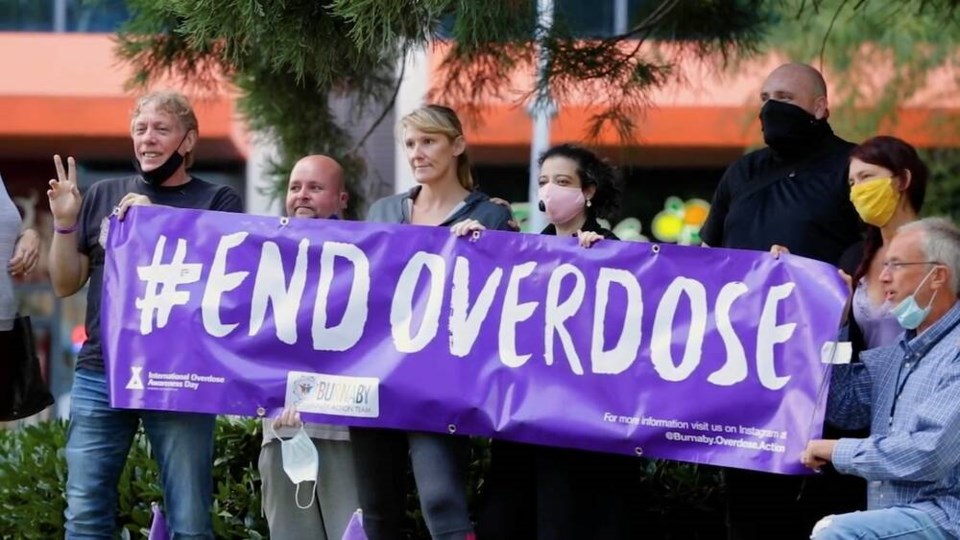The following column was submitted to the NOW from the Burnaby Community Action Team (BCAT), inviting readers to remember and honour the lives lost during B.C.'s toxic drug crisis, and demonstrate kindness, understanding and compassion towards people who use substances.
The team is hosting Burnaby’s 2024 International Overdose Awareness Day event on Saturday, Aug. 31, 3:30 to 5 p.m. at Burnaby Civic Square (6100 Willingdon Ave.), beside the Bob Prittie Library.
“It is estimated that as many as 225,000 people in B.C. remain at risk of unregulated drug injury or death.”
- Michael Egilson, Chair, Death Review Panel — Report to the Chief Coroner of B.C. Nov. 1, 2023
A public health emergency was declared for the first time in BC in April 2016.
The cause? A significant increase in substance-related sudden deaths. Unregulated drug toxicity is the leading cause of death in B.C. for persons aged 10 to 59, accounting for more deaths than homicides, suicides, accidents and natural disease combined. More than 15,200 B.C. residents have died since 2016, including 1,158 in 2024 so far.
This crisis continues.
In Burnaby, since 2016, there has been 448 deaths from the illicit and toxic drug supply, including 27 people who died in the first six months of 2024.
So far this year, BC Emergency Health Services (BCEHS) has attended 277 suspected drug poisoning events. Many more were attended by other emergency responders and family or friends who never visited the hospital.
No one is immune from the impact: drug-related deaths occur across all of the community health service areas of Burnaby.
These are not numbers: these are family members, friends, work colleagues, schoolmates. These deaths occur amongst people who use substances for recreation and those who use regularly. They are young and old, mostly men, but annually greater numbers of women are dying.
The victims are disproportionately indigenous, are married or single, with or without children, employed and unemployed, students and caregivers, and mostly (85 per cent) they die inside private residences where people use alone, and too frequently die alone.
This certainly was the case of my niece, a vivacious, gorgeous 44-year-old who came to use illicit drugs after being treated after a car accident with prescribed highly addictive pain killers.
Thankfully, the Burnaby Community Action Team (BCAT), comprising of many health, social service and housing providers who, partnered with people with lived experience, together dedicate their skills and knowledge to reduce these needless deaths.
BCAT recognizes the major barrier to keeping people safe when using is the embarrassment and shame or fear of loss — loss of one’s job, friends and family.
Judgement and condemnation equals stigma. Words do matter.
Stigma is an underlying factor driving the illicit drug crisis in Canada. Stigma can influence our drug policies and programs, how people who use drugs are treated and therefore how they are viewed in society. It is time for us all to recognize new ways of thinking are imperative when it comes to substance use.
We know what works: having everyone recognize this as a health issue, not a moral failure. Recognizing that the cause is the poisoned illicit drug supply – fentanyl and more.
And, knowing how to assist people who use drugs such as by having conversations around substance use.
Let’s bring it out of the dark.
Learning the resources and getting trained on Naloxone that reverses or blocks the effects of opioids (e.g. fentanyl) on the body. Supporting people find safe drug supply. And knowing there are tools such as drug testing to determine the actual ingredients of the drugs they may ingest, and the LifeSaver App so that if they use alone, they can get the immediate help they need.
These deaths are preventable when barriers such as stigma are eliminated. Let’s not define anyone by their drug use, let’s be respectful.
Not everyone using has a dependency on substances, but for those that do, it should be recognized as a treatable medical condition, not a choice, and as deserving of care as any other health condition.
- Karen O’Shannacery, OBC
📣 Got an opinion on this story or any others in Burnaby? Send us a letter or email your thoughts or story tips to [email protected].
📲 Want to stay updated on Burnaby news? Sign up for our free daily newsletter.
💬 Words missing in an article? Your adblocker might be preventing hyperlinked text from appearing.



